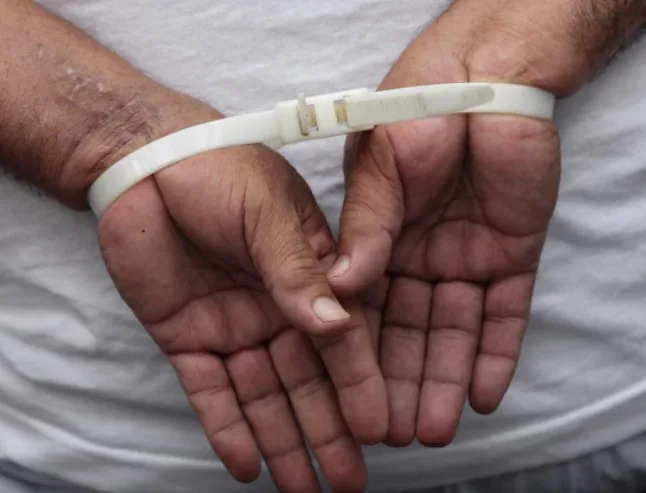Lessons from El Salvador: People will always sacrifice human rights to control rampant crime
By Megan McArdle
In 2015, El Salvador was the world’s murder capital, with 107 homicides per 100,000 people — as if one of Chicago’s worst neighborhoods was a country unto itself. Since then, homicide in El Salvador has fallen so far, so fast that it looks comparable to the United States’ rate and may still be falling.
Instead, the country now boasts another, equally dubious title: Grand Champion Incarcerator. Under President Nayib Bukele, the government has shredded basic judicial protections, locking people up on as little basis as tattoos or anonymous phone calls.
The government itself acknowledges having released thousands who were arrested in error. Their number is dwarfed by the number still behind bars. More than 1 percent of the country’s population reportedly languishes in prison, unable to secure adequate food, in overcrowded circumstances that invite comparisons to “tattooed sardines” or “slices of sandwich bread.”
 As a libertarian and a passionate advocate for ending mass incarceration, I wish I could say these two shifts are unrelated. But reality refuses to humor my ideological preferences.
As a libertarian and a passionate advocate for ending mass incarceration, I wish I could say these two shifts are unrelated. But reality refuses to humor my ideological preferences.
Even Bukele’s critics seem to concede that his actions have functionally destroyed the criminal street gangs that drove the country’s astounding crime rate. In the short term, at least, it seems that savagery has restored order to El Salvador’s streets. And the savagery is incredibly popular; as next year’s election approaches, polls have put Bukele’s approval ratings as high as 90 percent, and none of his likely opponents appear to have any chance of an upset.
The reason a quasi-police state looks so good to Salvadorans is that so many of them were already living under a police state, except that it was run by gangs such as MS-13. Want to have a business? Pay hefty extortion. Want to own a vehicle? You owe the gang a monthly fee. Want to play soccer on the local field? Sorry, that’s gang turf. Want to have relatives visit you at home? First get permission from the local boss for them to enter his territory. Reject the wrong suitor? He might kill you. He also might kill you just because he can.
Residents of gang territory had no recourse, because anyone testifying against a gang member risked death. Bukele’s erosion of due process reversed the power dynamic: Now, you don’t have to testify, you just make an anonymous phone call. This required Bukele to take undemocratic shortcuts, undermining the independent judiciary and centralizing immense powers in himself. It put a lot of innocent people in jail, many in horrific conditions.
Along with mass imprisonment, it also made it impossible for the gangs to keep control of their victims. As a result, soccer pitches are reportedly now overrun with kids rather than thugs, people can go where they want, and commerce is resuming in areas that used to be no-go zones.
I’d like to tell you that such trade-offs don’t exist. But it’s hard to maintain the rule of law when gangs kill witnesses. It’s also hard to fight root causes such as poverty when as much as 80 percent of your territory is controlled by gangs, because gang rule is a cause of poverty as well as a result: Gangs depress economic activity by reducing labor mobility, keeping people off the street, and bleeding business profits through theft and extortion.
It’s not entirely surprising that the people of El Salvador prefer the official police state to the freelancers. And this is where El Salvador offers a useful lesson to the rest of us: Do not make people choose between human rights and safe streets, because they will choose safe streets every time.
Obviously, the United States has nothing like 107 homicides per 100,000; at its 1990s peak, our rate was less than one-tenth of that. But in life, as in philosophy, extreme examples can illuminate normal quandaries. U.S. history shows the same pattern as El Salvador, albeit in a milder form: When crime soared in the latter half of the 20th century, American politics took a sharp lurch away from mercy and toward tough-on-crime policies that eventually led us to lock more than a million and a half Americans behind bars. Even deep-blue New York City elected Rudy Giuliani, a Republican former prosecutor who promised to do what it took to regain control of the streets. When the coronavirus pandemic brought another sharp increase in crime, we quickly saw the same politics reemerge.
Like many social phenomena, crime is prone to tipping points. When it is low, criminals stand out and are more likely to be apprehended. As it rises, police and courts get overwhelmed, and criminals are less likely to be punished — so they commit more crimes. The best way to keep people from trading civil liberties for civic safety is to not let crime get out of control in the first place.
_____________________
Megan McArdle is a Washington Post columnist and the author of “The Up Side of Down: Why Failing Well Is the Key to Success.”
Credit: Washington Post




















